Site Search
- resource provided by the Forum Network Knowledgebase.
Search Tip: Search with " " to find exact matches.
A new nonpartisan resource, Foundation Funding for U.S. Democracy, provides data about foundations and their democracy-related grantmaking in a structured, contextualized, and visual format. Foundation Funding for U.S. Democracy was created through a partnership of eight funders in the field, including the Rita Allen Foundation, and is being developed by the Foundation Center.
The tool allows funders, nonprofits and other interested parties to sift through data on the $1.7 billion (and counting) granted by foundations to strengthen civic engagement in the United States since 2011. For the first time, we have an open tool for visualizing who gave how much to whom for what. While the tool and the data will continue to develop, it already gives a tremendously useful view of opportunities for greater partnerships and knowledge in the field—both for funders and for the organizations, small and large, established and emerging, working to strengthen our democracy. As Kelly Born of the Hewlett Foundation, another of the project partners, writes in a post introducing the tool: “As useful as this data set and visualization will be for foundations already working in the field or new funders considering entering it, the real killer app for this work will be to help grant seekers.”
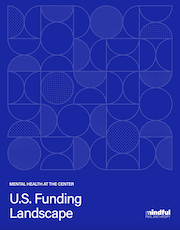
This comprehensive report provides an in-depth view of philanthropic giving toward mental health, addiction, and well-being in the United States.
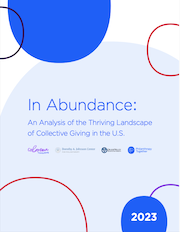
In Abundance: An Analysis of the Thriving Landscape of Collective Giving in the U.S. explores the transformative impact of collective giving on philanthropy. Practiced in cultures all around the world, collective giving brings people together to pool their resources, including time, talent, treasure, testimony, and ties — often referred to as the 5Ts. Groups like giving circles, SVP chapters, giving projects, and nonprofit-led circles have long served as democratic and philanthropic learning hubs — bringing historically marginalized voices into philanthropic decision-making spaces, challenging preconceived notions of who is considered a philanthropist, and elevating members as integral actors in our sector’s efforts to advance diversity, equity, and inclusion in giving.
A partnership between the Johnson Center, Colmena-Consulting, and Philanthropy Together, this report underscores collective giving groups’ role in reshaping philanthropic practices, fostering social connections, and amplifying the voices of marginalized communities.
Giving circles and other forms of collective giving (hereafter referred to as GCs) have grown significantly in visibility and popularity over the past 15 years. Often started by donors, they are widely understood to be highly flexible, democratic, do-ityourself vehicles for giving. Previous research has illuminated the positive impact that participation has on the giving and civic engagement of donors. Until recently, however, our understanding of the scope and scale of GCs was 10 years out of date!
This research presents an updated understanding of the current landscape of GCs and similar models of collective giving or giving collaboratives in the United States. This research comprises the first of a three-part inquiry, which also looks at research underway related to the impact of participation in GCs on donor giving and civic engagement, and a study of the relationships between GCs and their hosting organizations.
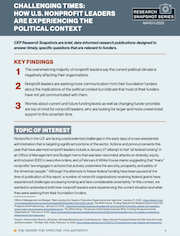
CEP surveyed a nationally representative sample of nonprofit leaders to understand how nonprofits are experiencing the rapid shifts in policy from the new presidential administration and the current political climate.
This paper explores community democracy as a cultural choice and a potential organizing system for philanthropy using stories that demonstrate its principles and practices, primarily growing from the experience of northern California communities. This experience offers a framework of principles and a beginning set of conclusions about how philanthropy can develop productive partnerships from the perspective of a place-based, community democracy.
This resource guide includes various virtual volunteer opportunities, additional resources, and best practices for corporate volunteer programs during the coronavirus pandemic.
This resource will be updated, as CNJG and corporate members collect new information and opportunities to share with colleagues.
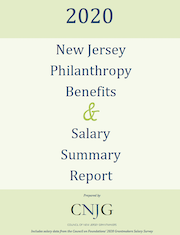
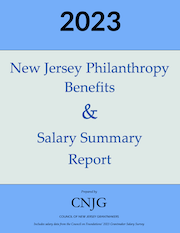
President Obama's Hurricane Sandy Task Force released this rebuilding strategy to serve as a model for communities across the nation facing greater risks from extreme weather and to continue helping the Sandy-affected region rebuild. The Rebuilding Strategy contains 69 policy recommendations, many of which have already been adopted, that will help homeowners stay in and repair their homes, strengthen small businesses and revitalize local economies and ensure entire communities are better able to withstand and recover from future storms.
The Ford Institute for Community Building, a program of The Ford Family Foundation, works to help community leaders learn how to implement local solutions based on principles of effective community building. This paper describes the development and work of the The Ford Institute for Community Building.
A CNJG member queried our listserves on policies regarding: 1) number of vacation days for new full-time employees; 2) paid time off (PTO); and 3) working remotely. CNJG compiled the answers from responding members.
A CNJG member queried our listserves for sample questions (not included in the grant application) you might ask grantees or potential grantees during site visits. CNJG compiled these responses, and other documents members use.
From the Commonfund, these white papers on investment policy statements, spending policy, board governance and risk tolerance, together with their most recent studies of investments at private and community foundations, operating charities and nonprofit healthcare organizations are made available though CNJG's Investment Forum for Foundations and Endowments.
